Perched on the dramatic cliffs at the southern tip of Bali, Uluwatu is known for its beaches, world-class surf spots and the iconic Uluwatu Temple. I visited this village during my two month trip around Bali and loved it. Whether you’re here to see the fiery Kecak dance at sunset, ride the waves or take in the breathtaking cliffside views, you’ll have an unforgettable experience. Here’s your guide to the best things to do in Uluwatu, Bali.

This post may contain affiliate links. That means, if you make a purchase, I may receive a small commission. As an Amazon Associate I earn from qualifying purchases. For more information, read my disclaimer.
Where to stay in Uluwatu
Finding the right place to stay in Uluwatu can enhance your experience. Here are some of the best accommodation options close to Uluwatu’s temple and beaches.
A short walk from the temple is Kubu Nyang Nyang Uluwatu, which has spacious bungalows surrounding a gorgeous outdoor pool. There is free private parking, bike rental and a great restaurant. Please note, there is currently construction work nearby until March 2025.
Alternatively, Davu Sundara Villa Uluwatu is also a short distance from Uluwatu Temple. This villa has a modern Balinese design with spacious rooms, a private infinity pool and stylish outdoor seating areas. Guests love the villa’s stunning views, especially during sunset.

For more hotels in Uluwatu, explore the map below:
What are the best things to do in Uluwatu, Bali?
Uluwatu blends adventure, relaxation and culture, thanks to its serene beaches, legendary surf spots, hidden caves and yoga with ocean views.
For me, the true highlight of Uluwatu was watching the fire and Kecak dance at the iconic Uluwatu Temple.
Let’s explore this and all the other things to do in Uluwatu.
Witness the sunset Fire and Kecak Dance at Uluwatu Temple
The Uluwatu Temple (Pura Luhur Uluwatu) is one of Bali’s most iconic sea temples, perched on the edge of a 70-metre-high cliff overlooking the Indian Ocean. Dedicated to the spirits of the sea, it’s a must-visit for its breathtaking views and cultural significance.
At sunset, the temple comes alive with the Kecak Fire Dance, a traditional Balinese performance that tells the story of the Hindu epic tale Ramayana. Accompanied by a haunting chorus of chanting men, the dance features elaborate costumes, dramatic movements and a fiery finale.
I recommend arriving early so you get the best seat for the performance and have time to explore the temple grounds. Sarongs and sashes are provided at the entrance as a sign of respect when visiting the temple. Watch out for the mischievous monkeys who roam the area—they’re known to snatch loose items like sunglasses or phones.
Book your ticket in advance for the Kecak Fire Dance at Uluwatu temple here.
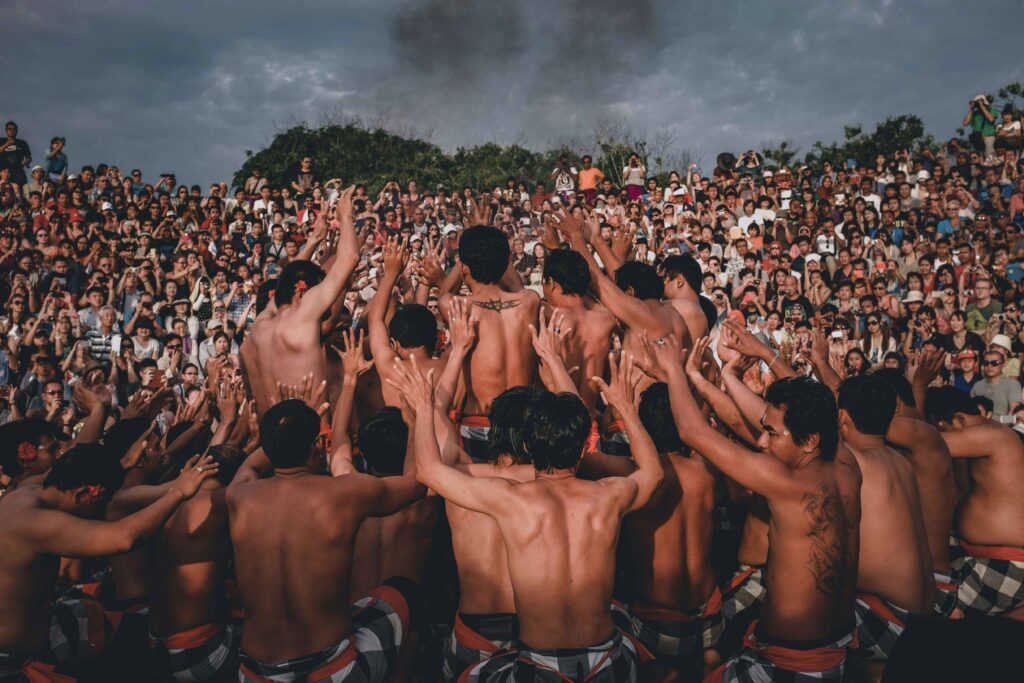
My experience at the Kecak Fire Dance at Uluwatu Temple
We were watching the mythical Kecak and Fire dance at Pura Uluwatu, the famous cliff-side temple in southern Bali, when one of the performers looked at me, held his hand out and invited me up to dance in front of the 300-strong crowd.
Costumed in white, with a large goggly-eyed mask, this clown-like character was a servant of Ravana the demon king – the villain of the piece.
While Rama and Sita, the good characters in the Kecak and Fire dance, were very beautiful and earnest, with their elaborately decorated golden outfits, Ravana the bad guy was playful and entertaining, making the crowd laugh with his flamboyant antics.
Of course I accepted his invitation.
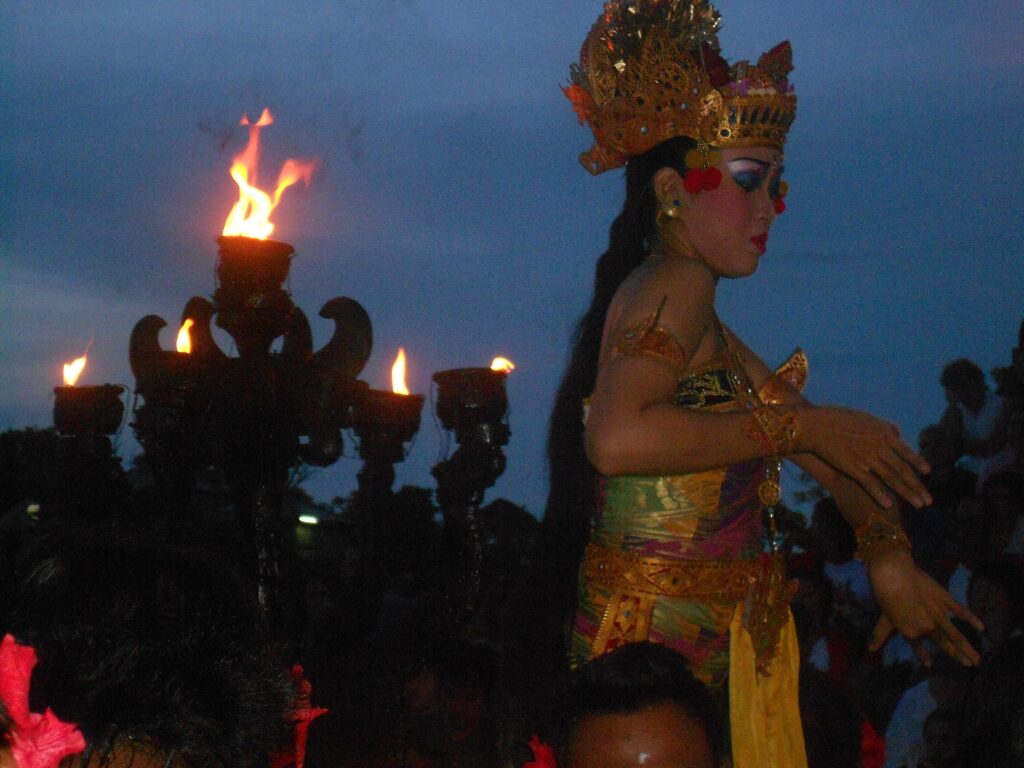
The performance, set against the backdrop of a golden sunset and crashing waves, was nothing short of magical.
Watching the flames flicker as the sun set over the ocean, while performers bring the ancient Ramayana story to life, is a moment I’ll never forget.
Don’t miss the Kecak Fire Dance at Uluwatu temple – book your ticket here.
Surf world-class waves
Uluwatu is a paradise for surfers, with some of Bali’s best surf spots. The waves here are renowned for their consistency and quality, attracting surfers from around the globe.
If you’re looking for where to go surfing in Uluwatu, Suluban Beach (Blue Point) is the ultimate destination. Located beneath towering cliffs, this hidden gem is one of Bali’s most famous surf spots, offering consistent reef breaks that attract experienced surfers from around the world.
Other top nearby surf spots include Padang Padang Beach, known as the ‘Balinese Pipeline’ and famous for its powerful reef breaks. Also in the area is Bingin Beach, which has challenging waves and a more laid-back vibe.
If you’re new to surfing, local surf schools in Uluwatu can get you started with lessons tailored to beginners.
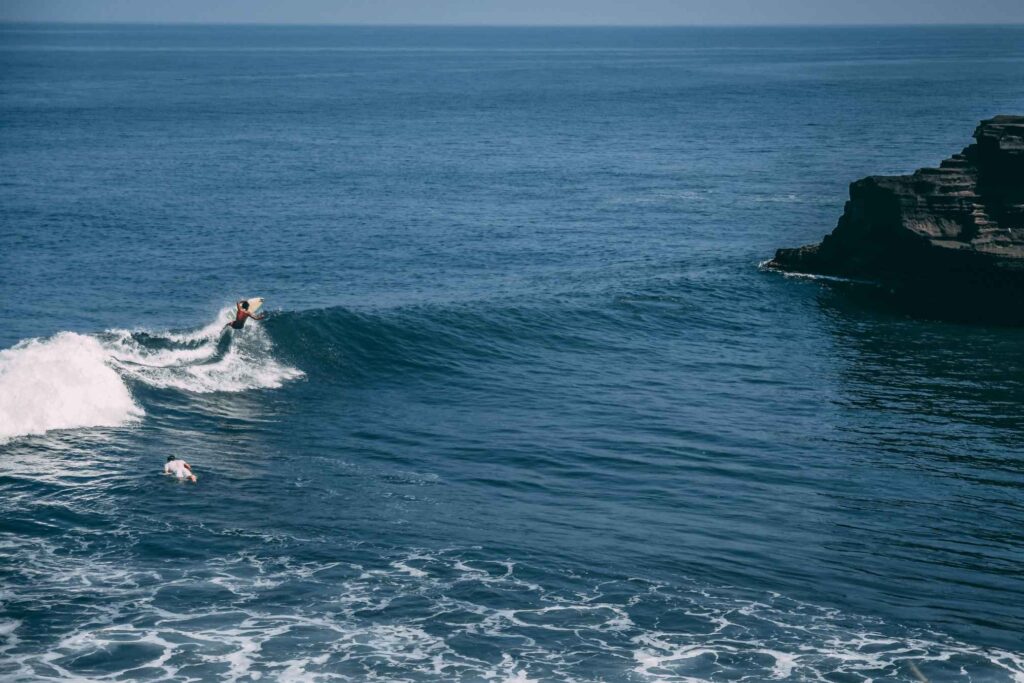
Relax on Bali’s best beaches
Uluwatu’s beaches are postcard-perfect, with turquoise waters, white sands and dramatic cliffs.
As well as Suluban Beach, there’s Nyang Nyang Beach, a secluded paradise with soft sands and shipwreck remnants for an adventurous vibe.
The beaches in this part of Bali have a unique charm, whether you’re seeking a peaceful escape or a vibrant surf scene.
Less than 20 minutes’ drive from Uluwatu is the iconic Padang Padang Beach, featured in the movie Eat Pray Love. It’s a small, picturesque cove accessible via a steep staircase. As well as surfing hotspot Bingin Beach, the nearby Dreamland Beach is great for sunbathing and swimming, with a few local warungs (cafes) serving snacks and drinks.
Explore the best beaches of South Bali at your own pace on a private tour with a driver – book it here.
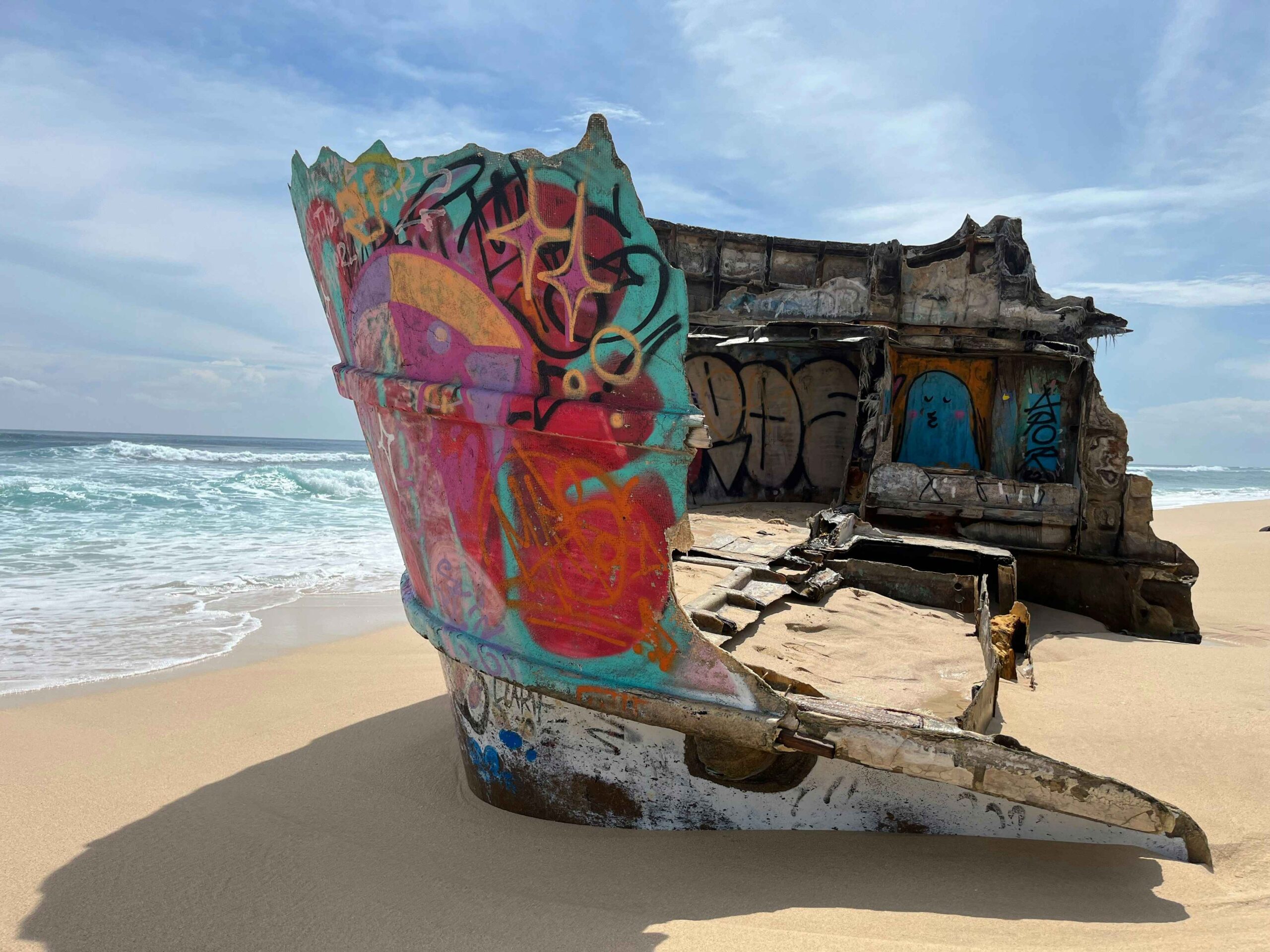
See one of the world’s tallest statues
A 20-minute drive from Uluwatu, is a cultural park that’s home to the impressive Garuda Wisnu Kencana statue, one of the tallest statues in the world.
Standing at 121 meters, it depicts the Hindu god Vishnu riding the mythical bird Garuda.
The park also hosts cultural performances, art exhibitions and festivals, making it a great place to delve deeper into Balinese traditions.
Buy your ticket to the Garuda Wisnu Kencana Cultural Park here.
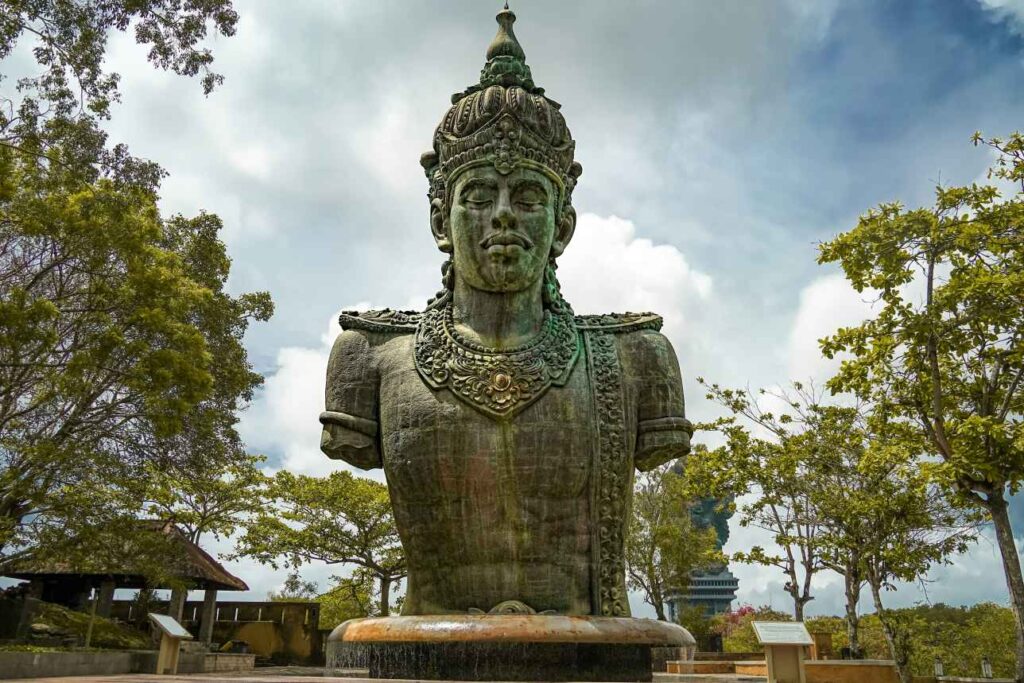
Explore Uluwatu’s unique caves
Beneath Uluwatu’s cliffs lie hidden caves waiting to be explored.
Suluban Cave, accessible from Suluban Beach, is a natural wonder with its narrow passages and tidal pools.
It’s a must-see for adventurous travellers and photographers and one of the best things to do in Uluwatu, Bali.
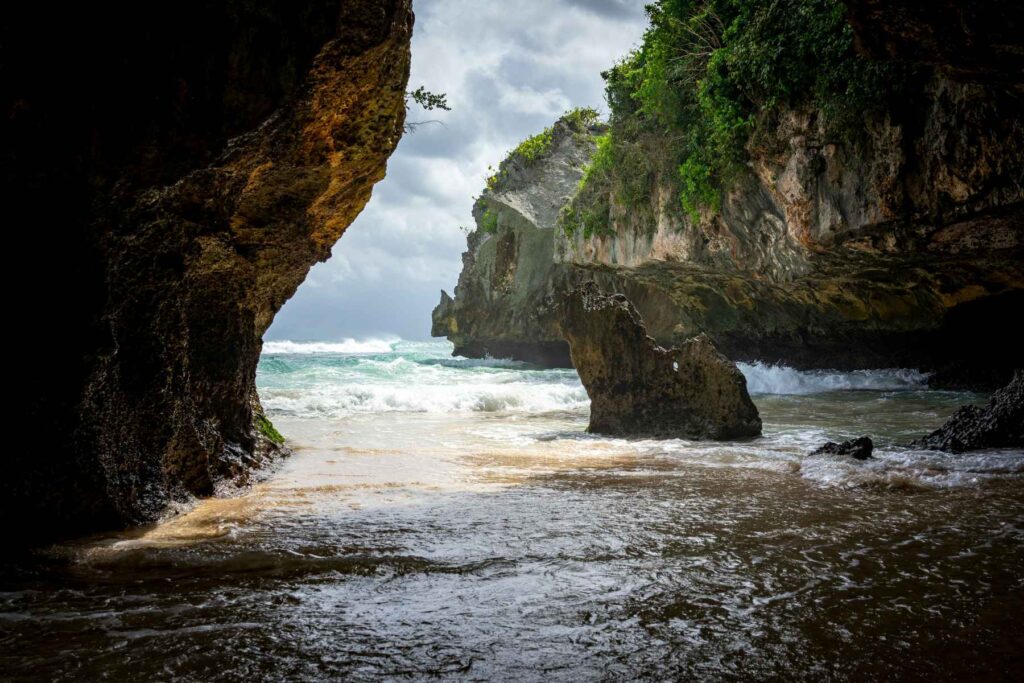
Take a yoga class with unbelievable ocean views
Uluwatu’s serene atmosphere makes it an ideal destination for yoga enthusiasts.
Many resorts and yoga studios offer classes with stunning views of the ocean, creating a peaceful space to stretch, meditate and recharge.
Popular yoga spots include the Morning Light Yoga Studio, a 5 minute drive from Uluwatu Temple. Located inside the Uluwatu Surf Villas, it provides daily classes with breathtaking views.
Check out this unique and very cute puppy yoga class in Bali.
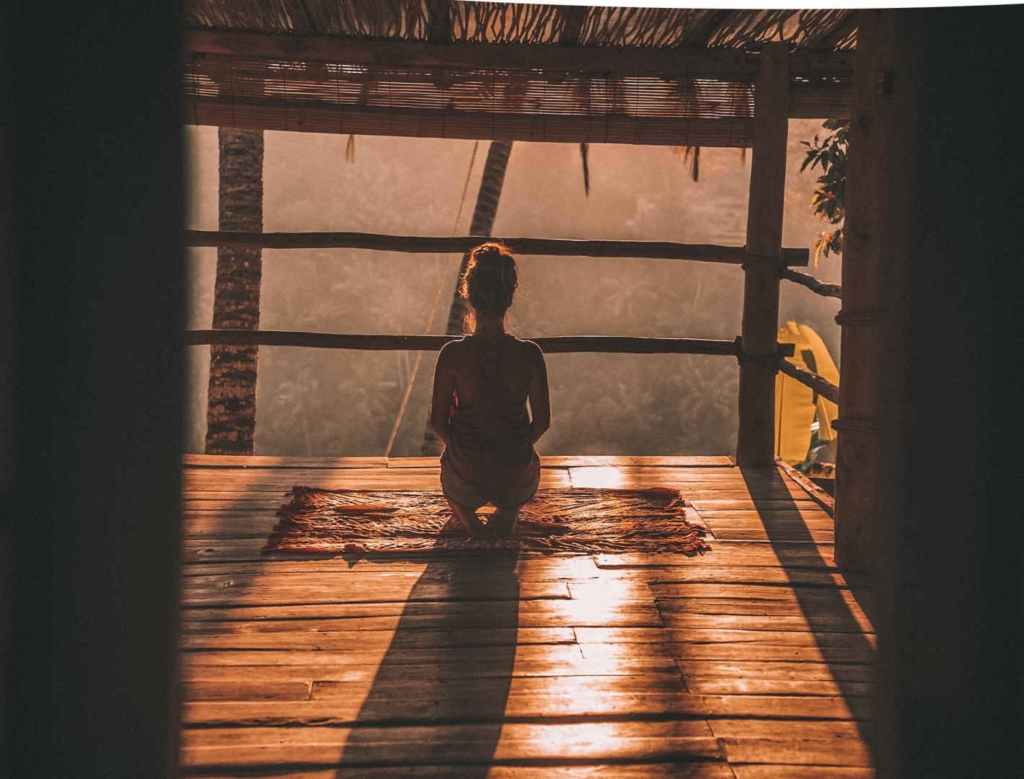
Watch the spectacular sunset from Karang Boma Cliff
For a truly awe-inspiring view, head to Karang Boma Cliff, also known as Uluwatu Cliff.
This lesser-known spot offers panoramic vistas of the ocean and surrounding cliffs. Watching the sunset from here is one of the best things to do in Uluwatu, Bali.
It’s also quieter than the temple area, making it a great alternative for those seeking solitude.
Enjoy the ultimate Uluwatu sunset kecak dinner experience here.

The best day trips from Uluwatu
These day trips from Uluwatu showcase Bali’s incredible diversity, from cultural landmarks to serene beaches and vibrant towns. Whether you’re seeking adventure, relaxation or cultural exploration, Uluwatu’s surrounding areas have something for everyone.
Jimbaran: For beachfront seafood and sunsets
Just 30 minutes from Uluwatu, Jimbaran is known for its golden sand beaches and fresh seafood. Spend the day relaxing on the calm shores, then indulge in a beachfront seafood feast as the sun sets. Jimbaran Bay’s grilled prawns, fish and squid are legendary and served at tables set right on the sand.
Nusa Dua: For watersports and coastal beauty
A 40-minute drive from Uluwatu, Nusa Dua is perfect for a day of watersports like snorkelling, jet-skiing and parasailing. Visit the Waterblow, where waves crash dramatically against the cliffs or relax on the calm beaches, which are ideal for swimming.
Balian Beach: For surfing and serenity
Located about 1.5 to 2 hours from Uluwatu, Balian Beach is a serene escape on Bali’s west coast. Known for its black sand and uncrowded surf spots, it’s perfect for surfers and those seeking a peaceful retreat.
Seminyak: For shopping and dining
An hour’s drive from Uluwatu, Seminyak is Bali’s hub for trendy boutiques, upscale dining, and chic beach clubs. Spend the day exploring its stylish shops and end with dinner at a world-class restaurant or drinks at a rooftop bar.
Tanah Lot Temple: For discovering Bali’s spiritual heritage
About 1.5 hours from Uluwatu, this sea temple is one of Bali’s most iconic landmarks. Perched on a rocky outcrop, Tanah Lot offers stunning views, particularly at sunset. It’s a fantastic spot to experience Bali’s spiritual heritage and take memorable photos.
Book a guided tour of Tanah Lot here.
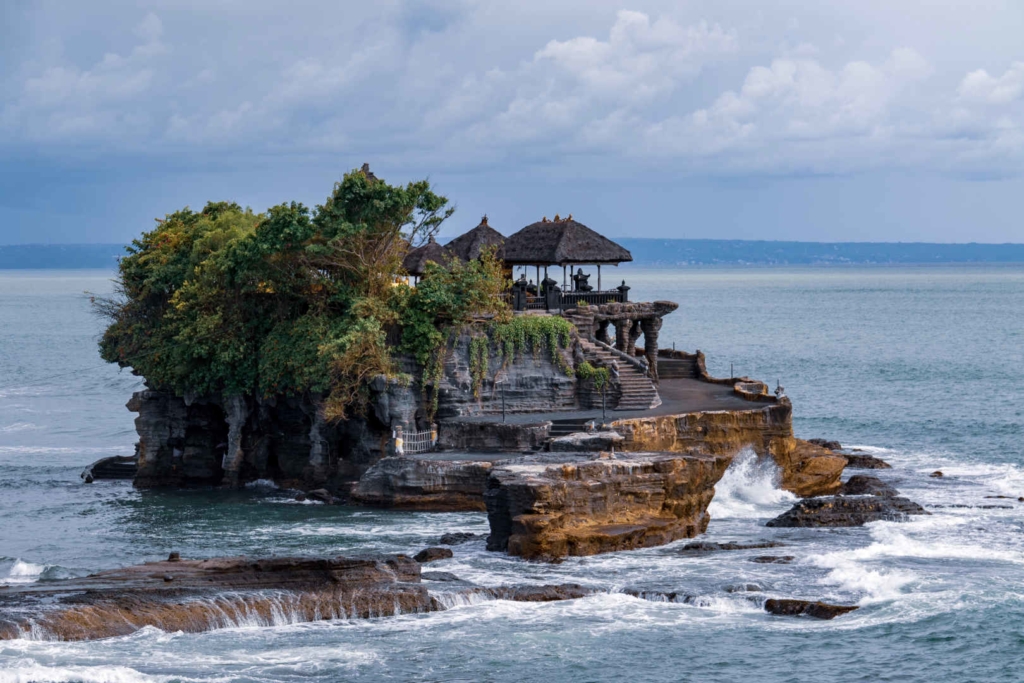
Where to eat and drink in Uluwatu
Uluwatu’s cliffside dining spots combine incredible views with delicious food. Enjoy a meal while watching the sunset paint the sky.
A 7-minute drive from Uluwatu Temple is Single Fin. Famous for its lively atmosphere and panoramic views of the surf below, it’s a great spot for cocktails and casual dining.
Further inland is Suka Espresso, which doesn’t have the views, but it’s popular for its fresh, healthy dishes with a focus on locally sourced ingredients.
How to get to Uluwatu
Getting to Uluwatu is relatively straightforward, as it’s located on Bali’s Bukit Peninsula, about 20 kilometres south of Denpasar. Here are the best ways to reach this stunning destination:
If you’re flying to Bali, Uluwatu is approximately a 45-minute to 1-hour drive from Ngurah Rai International Airport (Denpasar Airport). You can catch a taxi or pre-book a private transfer.
If you’re in Seminyak or Canggu, Uluwatu is about 1.5 to 2 hours away by car. From Ubud the journey takes around 2 to 2.5 hours by car.
Staying in Jimbaran or Nusa Dua is a good idea, as these areas are close to Uluwatu, with travel times ranging from 30 to 45 minutes by car or scooter.
Final thoughts on the best things to do in Uluwatu, Bali
From the spiritual allure of its cliffside temple and the hypnotic Kecak Fire Dance to its world-class surfing and serene beaches, Uluwatu has something for every kind of traveller.
Uluwatu is more than just a destination—it’s an experience that lingers in your memory.
Next up, read about the best itinerary for Ubud in Bali.


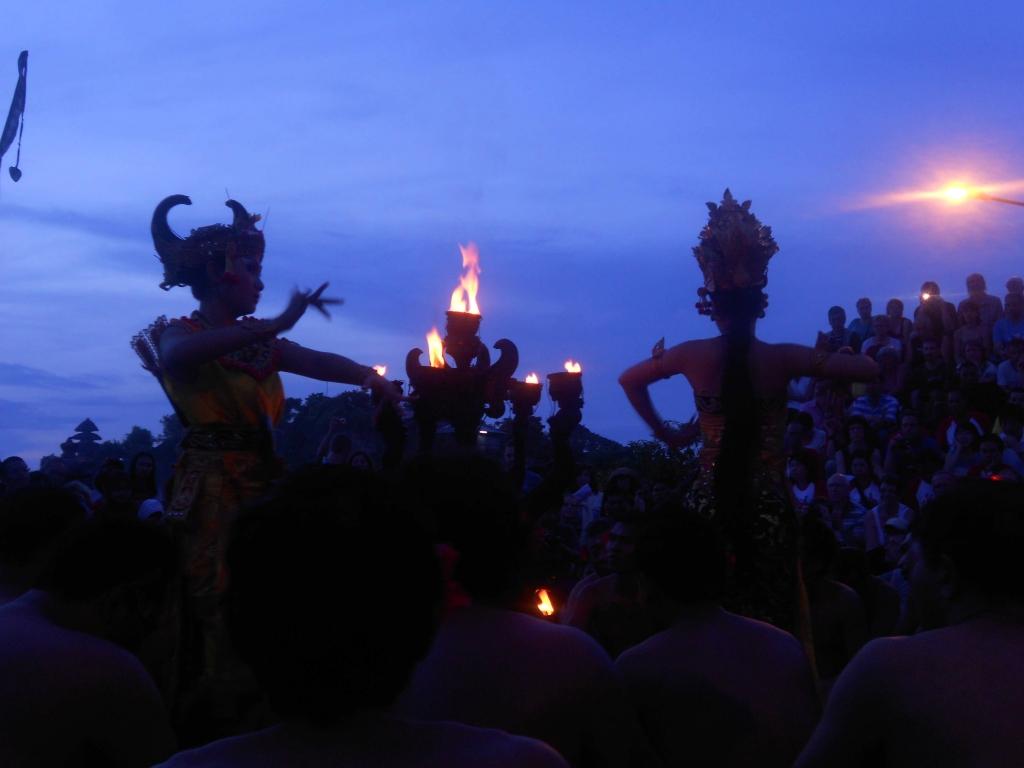
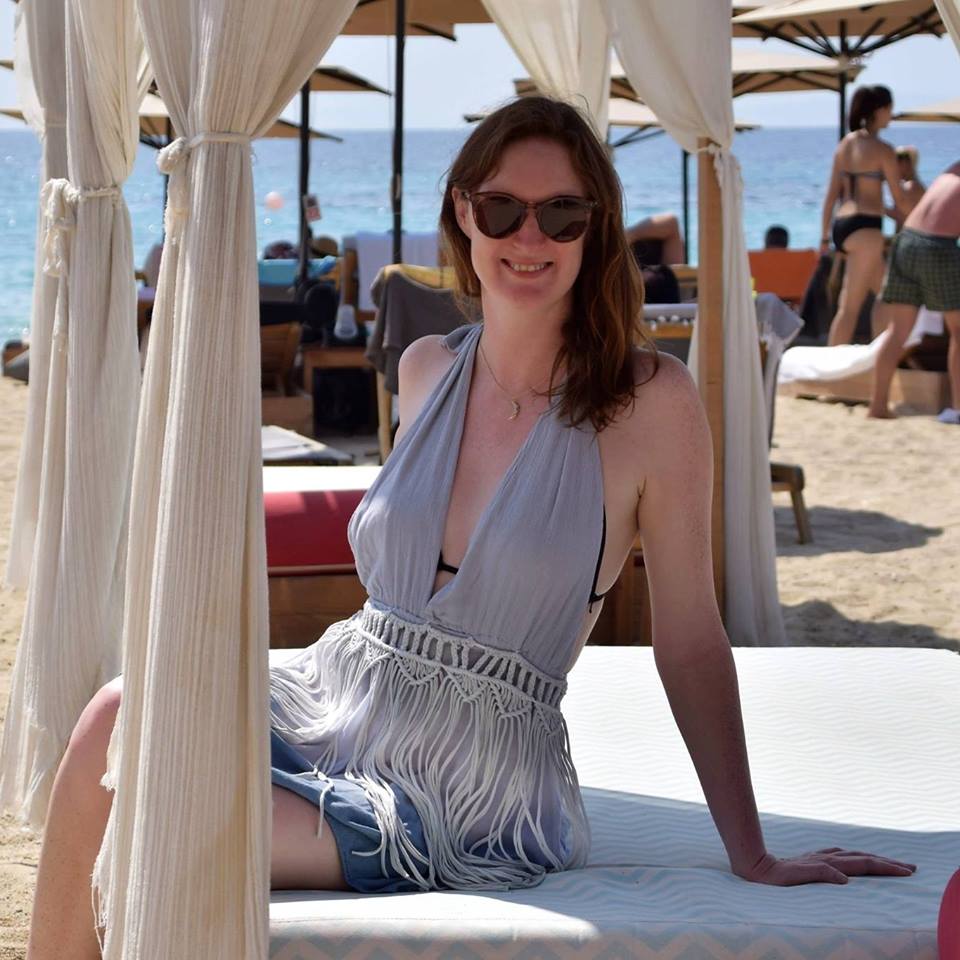
It was lovely reading through this post. It made me miss the time I spent in Bali. It is truly a beautiful place!
Thanks! I couldn’t agree more – Bali is such a special island. Happy to meet a fellow fan!